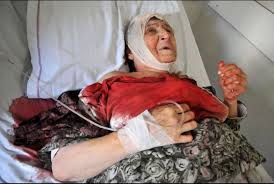Lebanon
Armed Civilians Spread Throughout Tripoli, Tight Security Measures

Numerous armed civilians spread throughout the northern city of Tripoli Saturday, in the wake of the twin blasts yesterday which left tens killed and hundreds wounded.
The vegetable market, Abi Samra and Zahiriyah neighborhoods were teeming with armed men who erected checkpoints, searched and scrutinized identity cards of those passing by.







